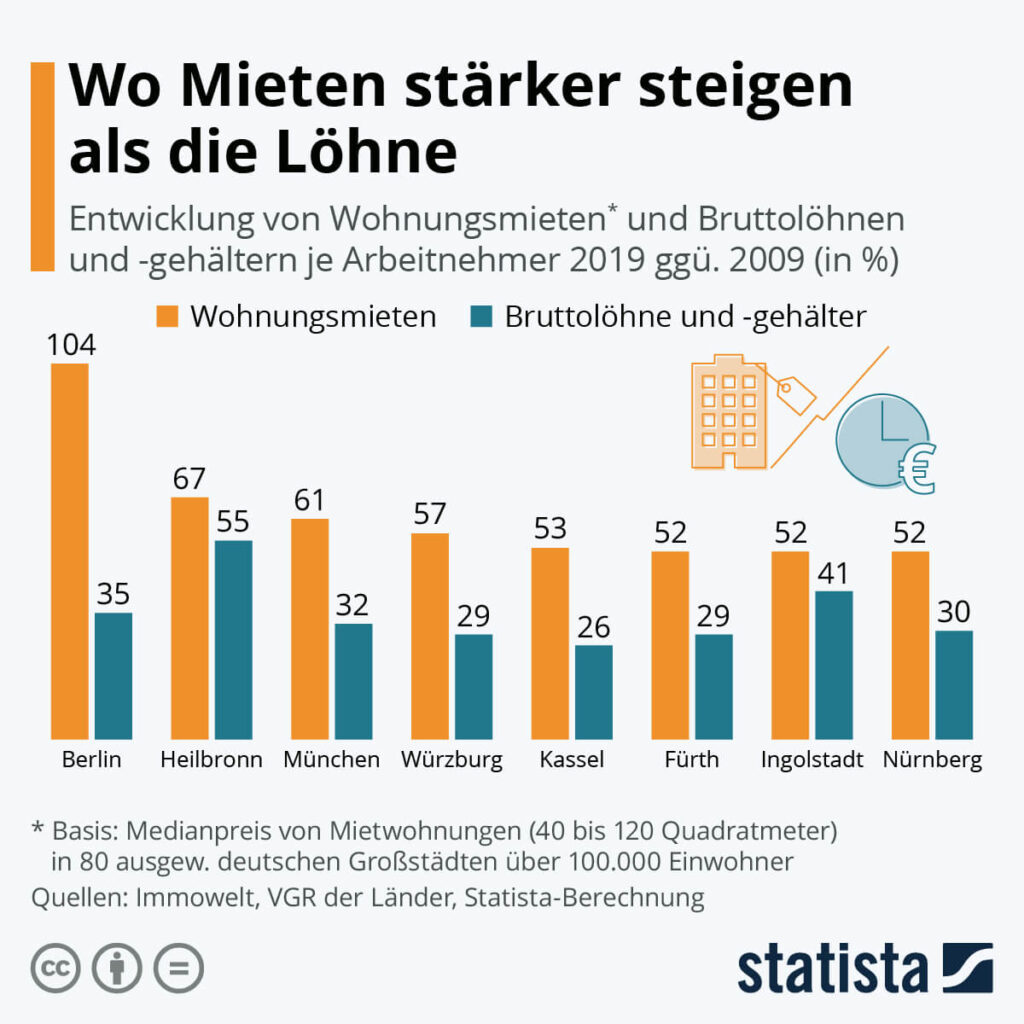Why Rents Have Been Exploding In Germany
Key Takeaways
- Rents in Germany rose a lot over the last few years and some people feel rents are “too expensive.”
- Salaries in Germany increased faster than rents in Germany, therefore making renting more affordable
- While rents in Germany increased only by +17% since 2010, property prices increased by 93% over the same time
Did Rents In Germany Really Explode?
Many people think that rents in Germany and the cost of living are “too high.” Especially people living and renting in large German cities like Berlin, Frankfurt, or Munich (where our business is). The idea that rents in Germany are “too high” is most of the time just a feeling or a personal impression and not backed up by any facts or data. Because the real question is: What does “too high” even mean? “Too high” compared to what? 🤔
Rents in Germany increased on a nominal level over the years and decades, and so did prices for food, cinema tickets, and everything else (at least with inflation). Rent prices are no isolated factor like some imagine them to be. Rents are just one single factor in the entire real estate universe. So in order to determine if rents in Germany are (too) expensive or not, we need to compare rent prices with other economic factors:
- How did incomes in Germany develop compared to rent prices?
- How did property prices in Germany develop compared to rent prices?
Only when putting other economic factors tied to real estate in perspective with rent prices in Germany, we will get the complete picture that will help us answer the question of this GermanReal.Estate blog post: Did rents in Germany explode? And if so, WHY did rents in Germany increase so much?
How Much Income Germans Spend On Rent
As income is the net salary for most people, let us compare how rents in Germany developed over the years in relation to net salaries. The German Economic Insitute in Cologne published in September 2022 how affordable rents are in the top 7 German cities (Berlin, Cologne, Düsseldorf, Frankfurt, Hamburg, Munich, and Stuttgart). The graph can be seen below.
The fundamental question of the graph is: How many sqm can the median earner afford to rent if he spends 25% of his net salary?
We can see clearly that Munich is the most expensive city to rent in Germany as all 4 bars are lower than in the other cities (=Munich has the lowest affordability).
The yellow/gold bars show how many sqm the median earner could afford in the year 2018, and the dark green bars show how many sqm the median earner could afford in the year 2021.
Interestingly, in 5 out of the top 7 cities in Germany, the median earner could afford more sqm in 2021 than in 2018. Only Stuttgart become more expensive by 1% and Cologne by 2% over the 3-year period.
Even though rent prices probably increased on a nominal value in all 7 top German cities, they still became more affordable for the median earner. How is that even possible? 🤔
It might sound counter-intuitive, but as local salaries in Germany increased as well, renting in the 7 A-locations became more affordable. But renting did not automatically become more affordable in all German cities. As Germany has a very diverse real estate market that can be split into many different regional markets, we have to take a deeper look when comparing salaries with rents.
Rent Increase Vs. Salary Increase In Germany
It puts the statement “Rents in Germany are too expensive” into perspective when comparing rents with German salaries, doesn’t it? The charts below compare rent prices vs. salary increases (gross salary this time, not net salary as above in the affordability graph) from 2009 to 2019.
Where Rents Rise Faster Than Salaries
Explanation: In Berlin, rents increased by 104% while salaries increased only by 35% from 2009 to 2019.
Where Salaries Rise Faster Than Rents
Explanation: In Rostock, rents fell by 5% while salaries increased by 35% from 2009 to 2019.
Pro tip: You might want to avoid investing in real estate in Rostock (3rd largest German city on the Baltic Sea). If rents are falling even though the employer market seems to be in the German average with ±35% growth from 2009 to 2019, property prices will have to follow eventually and go down as well. Rather invest in growing regions than in regions with falling property prices.
Profit from rising rents in Germany by investing in our real estate security tokens. You don’t even have to search for the right property or deal with tenants. Security tokens are as easy as it gets!
Rent Prices Vs. Property Prices In Germany
Rents in Germany did increase quite a bit, but property prices increased a lot more as seen in the chart on the right that compares rents vs. house prices in the European Union.
Houses in Germany almost doubled in value (+93%) from 2010 to the end of 2021. Rents on the other hand increased by +17% only in the same time period.
This is one reason why people keep talking about a real estate bubble in Germany. As property prices outgrew rent prices, the profitability for real estate investors goes down, leaving people to believe the German real estate market is going to crash.
The real question that is left aside in charts like the one on the right is: WHY did property prices increase so much? It is because Germany is not providing enough living for its population.
The goal of our German government is to build 400.000 new flats every year. Since the year 2000, Germany managed to build just 300.000 once (all other years just 200.000 – 250.000 flats).
That is why are sure that German real estate will continue to be an exciting investment over the term as rising rent prices increase passive income for real estate investors.
How You Can Profit From High Rents In Germany
In Germany, salaries rose continuously over the last few years, not just on a nominal basis but also on a real basis (adjusted for inflation). The good news for renters is that renting in Germany has become more affordable even though rents increased and some people think they have become increasingly “expensive.” The reality is, that salaries rose higher than rents in Germany making renting more affordable.
The good news for real estate investors (or people that want to become real estate investors in the future) is that property prices will continue to rise over the long term as Germany is not creating enough living space. Regional markets will play a huge role in the future increase of property prices. Real estate in cities like Rostock might fall in value while other cities like Düsseldorf (and suburbs like Mönchengladbach) might continue to rise in value.
If you are looking to invest in German real estate in the easiest way possible, then check out our marketplace. Thanks to the power of tokenization, we can offer blockchain-based real estate security tokens to our investors for just 1€ (minimum investment usually 100€).














Pingback: Mieten in Deutschland | GermanReal.Estate
Pingback: REITs In Germany | GermanReal.Estate
Pingback: How Inflation Impacts Real Estate Investors | GermanReal.Estate
Pingback: Real Estate Bubble Index | GermanReal.Estate
Pingback: Passive Income & Real Estate: Is That Possible? | GermanReal.Estate
Pingback: Global Real Estate Crash In 2023? | GermanReal.Estate
Pingback: How Are Returns On GermanReal.Estate Taxed? | GermanReal.Estate
Pingback: Special Purpose Vehicle (SPV) | GermanReal.Estate
Pingback: 2 Reasons For Rising German Property Prices | GermanReal.Estate
Pingback: Security Token | GermanReal.Estate
Pingback: Will The German Housing Market Crash? | GermanReal.Estate
Pingback: Mönchengladbach: Welcome Home Security Token | GermanReal.Estate
Pingback: Renting Vs Buying A Home In Germany - A comparison
Pingback: Everything About Real Estate In Germany
Pingback: Invest Money in Securities - We Can Help You! | GermanReal.Estate
Pingback: Real Estate Crowdfunding | GermanReal.Estate
Pingback: Benefits Of Tokenized Real Estate | GermanReal.Estate
Pingback: How To Register As Investor | GermanReal.Estate
Pingback: Real Estate With No Money | GermanReal.Estate
Pingback: Multiple | GermanReal.Estate
Pingback: German Real Estate In 2023 | GermanReal.Estate
Pingback: Germany Needs To Build More Properties
Pingback: 5 Tips for Successful Real Estate Investing in 2023: Expert Advice
Pingback: Simplifying Real Estate Investing With a Property Manager
Pingback: The Truth About the German Real Estate Boom: Supply, Demand, and Growth
Pingback: Comparing Median Rents in Germany: Cities with Lowest and Highest Rent